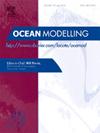Accuracy evaluation of global tidal models in the Bohai Sea via the combination of tide gauges and GFO satellite altimeters
IF 2.9
3区 地球科学
Q2 METEOROLOGY & ATMOSPHERIC SCIENCES
引用次数: 0
Abstract
Accuracy assessments of global tide models are essential for practical applications such as navigation and tidal correction in satellite altimetry. Traditionally, model accuracy assessment is performed by comparing global tide models with point-based tide gauges which are spatially limited in terms of number and location. To address the issue of the scarcity of tide gauges in the sea areas of interest, previous studies have introduced tide-favourable Topex/Poseidon (T/P)-Jason series as supplements in the course of model evaluation. However, the overlap of T/P-Jason series in model construction and evaluation may destroy the reliability of their evaluation results. In this study, we evaluate the accuracy of five popular global tide models (EOT20, FES2014, TPXO9, HAMTIDE12, and DTU16) in the Bohai Sea via the combination of four tide gauges and ∼8-year Geosat Follow-On (GFO) satellite altimeter records. The wide coverage of GFO data and their independence from analyzed global tide models guarantee the reliability of our findings. The results from GFO data and tide gauges are highly consistent, both revealing the superiority of FES2014 and the poor performances of TPXO9 and HAMTIDE12 in the Bohai Sea. The performances of FES-referenced models (EOT20 and DTU16) are generally good but slightly worse than that of FES2014. Of note, tidal amplitudes of eight major constituents derived from TPXO9 are abnormally small in the Bohai Sea. As water depths decrease, the errors of all five global tide models elevate notably, indicting the challenges in modelling coastal tides which may necessitate further exploration and improvements.
基于潮汐计和GFO卫星高度计组合的渤海全球潮汐模式精度评价
全球潮汐模型的精度评估对于卫星测高中的导航和潮汐校正等实际应用至关重要。传统上,模型精度评估是通过比较全球潮汐模型和基于点的潮汐计来进行的,而点潮汐计在数量和位置上都受到空间限制。为了解决感兴趣海域潮汐计缺乏的问题,以前的研究在模式评估过程中引入了有利于潮汐的Topex/Poseidon (T/P)-Jason系列作为补充。然而,T/P-Jason系列在模型构建和评估中的重叠可能会破坏其评估结果的可靠性。本文利用4个测潮仪和8年的GFO卫星高度计记录,对渤海地区常用的5种全球潮汐模式(EOT20、FES2014、TPXO9、HAMTIDE12和DTU16)的精度进行了评价。GFO数据覆盖范围广,且独立于已分析的全球潮汐模型,保证了我们研究结果的可靠性。GFO数据与测潮仪结果高度一致,均表明FES2014在渤海海域具有优势,而TPXO9和HAMTIDE12表现不佳。fes参考模型(EOT20和DTU16)的性能总体良好,但略低于FES2014。值得注意的是,从TPXO9得到的8种主要成分的潮汐幅值在渤海异常小。随着水深的减小,五种全球潮汐模型的误差都显著升高,这表明在模拟海岸潮汐方面存在挑战,需要进一步探索和改进。
本文章由计算机程序翻译,如有差异,请以英文原文为准。
求助全文
约1分钟内获得全文
求助全文
来源期刊

Ocean Modelling
地学-海洋学
CiteScore
5.50
自引率
9.40%
发文量
86
审稿时长
19.6 weeks
期刊介绍:
The main objective of Ocean Modelling is to provide rapid communication between those interested in ocean modelling, whether through direct observation, or through analytical, numerical or laboratory models, and including interactions between physical and biogeochemical or biological phenomena. Because of the intimate links between ocean and atmosphere, involvement of scientists interested in influences of either medium on the other is welcome. The journal has a wide scope and includes ocean-atmosphere interaction in various forms as well as pure ocean results. In addition to primary peer-reviewed papers, the journal provides review papers, preliminary communications, and discussions.
 求助内容:
求助内容: 应助结果提醒方式:
应助结果提醒方式:


